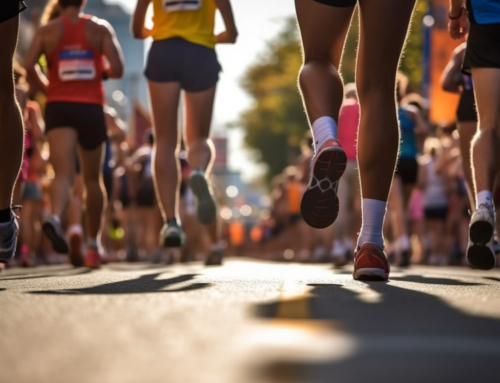Overtraining Symptoms – Signs That You’re Overtraining
What is Overtraining?
The term overtraining refers to when an athlete trains excessively, more so than their body can cope with or recover from. It can occur in all types of sports and has a negative impact on the individual’s performance levels.
Many runners, for example, are obsessed with training. They’re afraid to rest as they want to ensure they stay in shape and believe that the harder or more frequently they train, the faster they’ll be. They therefore increase the intensity of their workouts and add more runs into their weekly regime. This isn’t advised, however, as they’re attempting to do more work than they can physically handle and as a result their bodies are simply unable to recover.
Most athletes are actually unaware that they’ve been overtraining until they’re chronically overtrained. They suddenly come to a halt and need multiple weeks of rest to fully recover.
How to Know When Overtraining
How do you know if you’re overtraining? Here are some of the most common symptoms and signs that suggest you’re doing too much.
You Feel Fatigued
A telltale sign that indicates you need more recovery from your training is if you feel extremely exhausted after just carrying out your day-to-day tasks. For instance, if you’re a fit individual, then climbing a flight of stairs shouldn’t be too much trouble. However, if you get to the top and notice your quads are burning or you’re breathing heavier than usual, it’s probably time to take a break from the gym.
Fatigue will inevitably accumulate in a body that never has a chance to fully recover from previous workouts.
You’re Grumpy or Notice a Change in Your Mood
If you find that you don’t seem yourself and aren’t looking forward to or enjoying your workouts, then consider putting a pause to your training for a while. Running should be an enjoyable activity where you ‘get away’ from the real world. You might be mentally drained and may be in need of a rest week to allow you to completely recover.
Decreased Performance Levels
Despite an increase in training volume or intensity, another sign of overtraining is a lack of improved performance. Decreased agility, strength and endurance are all symptoms of overtraining.
The Majority of Your Workouts are at a High-Intensity
As a general rule of thumb, you should be doing no more than two hard workouts per week (although there are exceptions). If you find that most or all of your training is at a particular high-intensity, both your performance and health are likely to suffer.
Motivation Has Dropped
A lapse in motivation is completely normal now and again, but if you find yourself constantly preferring another activity to working out, then there’s a good chance you’re overtraining. If you have a desire to skip workouts, take it as a sign that your body is telling you something – you should listen. It’s common for athletes to find themselves physically overtrained when they try too hard to push through a motivational barrier, so give yourself an extra few rest days and you’ll come back more enthusiastic to train again.
Easy Workouts Become Hard Workouts
Another sign that might suggest you’re overtraining is if your normal, lower-intensity workouts feel unusually difficult. Perhaps it takes longer for your heart rate to return to normal or your legs feel even heavier than they usually do after a light 10-minute run on the treadmill.
Nagging Injuries
Overused muscles and joints can cause constant aches and pain – if you experience any pain or niggling injuries that don’t seem to improve within a few weeks, it’s best to give yourself an extra week or so to recover.
Overtraining also taxes all of the body’s systems and thus makes it trickier to ward off injections – again, this is another sign of overtraining.
Overtraining Recovery Time
How long it will take you to recover from overtraining will depend on a variety of factors –
- How overtrained you are
- Age
- Genetics
However, generally it takes most athletes a few weeks to a month of rest to fully recover. It’s important that you don’t rush your return to training, though, make sure you’re completely ready before you restart.
Once your muscles have had sufficient time to recover and are feeling fresh, and your motivation and excitement for training returns, you are coming to the end of your recovery. At this stage you can ease yourself back into it with a few low-intensity workouts and gradually build it up.
How to Avoid Overtraining
Here are some of our top tips for helping to prevent overtraining.
Train Progressively
In order to progress and improve without overtraining, you must train progressively and increase your training load at a gradual rate. A good rule to stick to is to increase your weekly training volume by no more than 10% each week – so if you train for 5 hours this week, train no more than 5 hours 30 mins next week.
Cool Down
After exercising, take the extra time to cool down and stretch the muscles you’ve just used. Particularly focus on stretches that work on tight and restricted areas of your body.
See more: Best Stretches for Runners
Rest More
Your body needs rest in order to grow and develop. Take rest days and have fun, and make sure you get a sufficient amount of sleep too.
Balanced Diet
A balanced diet is crucial when it comes to avoiding overtraining. This includes consuming the right number of calories and drinking plenty of water to keep your body hydrated. Carbohydrates are key as your body uses it as energy, and protein is also essential as it helps your muscles to repair themselves.
Training Challenges with Race At Your Pace
Here at Race At Your Pace, we’re dedicated to helping people of all ages and abilities enjoy exercising. Every month we organise non-competitive running, walking, cycling and swimming virtual challenges that task you to cover a specified number of miles before the end of the month. The distance can be completed at a pace that suits you and in however many stints you require.
Find out more or sign up today!
See more: How to Prevent Running Injuries
See more: How to Avoid Stitches When Running



